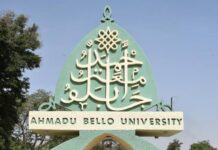Power & Polo: A South Carolina town has an unusual history as a magnet for rich horse lovers; What secrets does it hold?
The Post and Courier’s partners in this project include John Dell’Osso from the Platform to Protect Whistleblowers in Africa, The Aiken Standard, Houston Chronicle and Organized Crime and Corruption Reporting Project.
1. Whispers and horses
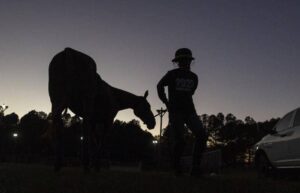
Twenty-three years ago, a middle-aged man from Nigeria traveled to Aiken to buy a horse farm. He’d arrived unannounced to close the deal. It was a warm day, the end of the polo season.
He wore Bermuda shorts, sandals and socks, and a colorful shirt. Despite his casual clothes, he had an elegance about him. After all, he was the head of Nigeria’s government mint, friendly with American diplomats and the son of a Nigerian sultan. He’d come prepared. He had a briefcase.
And money from overseas was on the way.
Aiken has long been a hideaway, thanks to sand and horses. It’s in South Carolina’s sandhills, a belt of gentle plateaus formed in part from ancient dunes when seas were higher. In 1830, a Charleston businessman named William Aiken built one of the nation’s first railroads to these sandy knolls. Soon, wealthy Charlestonians rode poky steam engines to the sandhills to escape the Lowcountry’s malaria and heat.
While Charlestonians used Aiken as a haven from sweatbox summers, affluent northerners saw the small city as a refuge from winter. Huge wooden hotels went up for well-heeled snowbirds. After the Civil War, town leaders also promoted the area as a medical retreat with “bracing atmosphere so grateful to invalids.” But it was the area’s sandy terrain that cemented Aiken’s place as an enclave for the rich and their secrets. Sand drains quickly after heavy rains, and this is especially important in polo.
Polo ponies and their riders charge across fields at 30 mph and often make quick stops and turns. The safety of horses and riders depends on stable footing. Fast-draining soil is a plus, and Aiken’s old sandhills meant fewer muddy fields and more time for polo. In the 1890s, wealthy polo players made Aiken what they called their “Winter Colony.”
Vanderbilts, Whitneys, Astors, Pulitzers — America’s most powerful families soon arrived by rail, mixing easily in Aiken’s cocktail of isolation and comfort. Mining heiress Evalyn Walsh McLean, the last private owner of the Hope Diamond, is said to have misplaced her jewel and invited party guests to find it.
Franklin D. Roosevelt stayed at Aiken’s grand Willcox Hotel before and during his presidency, using a special back door to meet his mistress, Lucy Mercer Rutherfurd. During World War II, Roosevelt secretly met Winston Churchill, an avid polo fan himself, at the Willcox to plot war strategy.
Today, Aiken remains a powerful magnet for wealthy horse lovers, including some with checkered pasts. The city still has a large horse district with stately mansions on sand roads. Horses and their riders still use these soft lanes to reach polo fields, steeplechase tracks and horse-jumping venues. And you can still hear horses neighing behind tall brick walls. But Aiken’s polo and horse culture is more international now. Its recent investors include the billionaire ruler of Dubai, a West African oil tycoon and a Russian oligarch.
And then there’s the curious case of Sambo Dasuki.
In 2015, Dasuki was Nigeria’s national security advisor, the president’s top military aide. Nigerians elected a new president that year who vowed to crack down on corruption. Security forces raided three of Dasuki’s homes, finding weapons, armored cars and cash. Prosecutors eventually accused him of “criminal diversion” of $2.1 billion from the government. The prosecution is ongoing. He has denied the allegations.
But years before his arrest, Dasuki and his wife had traveled to South Carolina to look at a horse farm tucked down a private road on Aiken’s outskirts.
What happened next had long remained hidden, like the farm. But a deeper look by The Post and Courier’s Uncovered project and a consortium of international journalists reveals a much deeper story: How powerful people from across the world exploit weak transparency laws to pump money into unexpected corners of the United States, including the sandhills of South Carolina.
Dasuki’s story spans continents and cultures. It comes amid increasing efforts to keep some foreigners out of the country, while allowing others with deep pockets and sketchy pasts to buy pieces of it. A coalition of anti-corruption groups recently estimated that kleptocrats and foreign crooks laundered at least $2.3 billion through U.S. real estate between 2015 and 2020. Money laundering experts say that American attorneys and real estate agents helped grease the sales.
It also comes amid shifting enforcement priorities. This month, the Trump administration disbanded the federal “Klepto Capture” task force, a program that targeted assets of Russian oligarchs. Congress passed bipartisan legislation targeting crooks who park dirty money in real estate. But some U.S. senators are trying to repeal the anti-corruption law, and business groups are fighting it in court.
Yet embedded in Dasuki’s story are reminders about the insidious nature of corruption — how breakdowns in norms allow misconduct to fester, whether in Nigeria or South Carolina.
It’s a tale of money power and polo
2. The sultan’s son
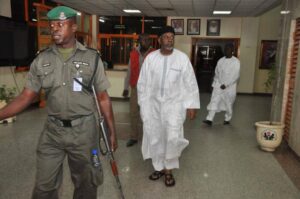
Aiken is more than 5,000 miles from Nigeria, but Sambo Dasuki’s trip to South Carolina’s sandhills in the early 2000s makes more sense given his family’s controversial rise to power.
The Dasuki family is from northern Nigeria, where the Sahara Desert meets the humid tropics to the south. Northern Nigeria’s horse culture is much older than Aiken’s. For centuries, traders and mounted forces used horses on the edges of the Sahara. Today, festivals called durbars celebrate this legacy with massive decorated horse parades. British maritime officers introduced polo to Nigeria in the early 1900s, and the sport remains an important addition to the region’s horse culture, especially for the wealthy.
“You can’t understand the mentality of the northern (Nigerian) political elite without understanding polo,” said Ebenezer Obadare, a senior fellow at the Council on Foreign Relations, a New York-based think tank. “The polo stands are where the Nigerian 1 percent converge.”
Sambo Dasuki’s father, Alhaji Ibrahim Dasuki, was part of that 1 percent. In the 1980s, he was chairman of a Nigerian railroad company and founder of Nigeria’s branch of the Bank of Credit and Commerce International, better known by its acronym BCCI. During this time, BCCI earned a reputation as the world’s “sleaziest bank,” derided by other bankers as the “Banks of Crooks and Criminals International.”
In the late 1980s, prosecutors and journalists exposed how BCCI’s branches around the world wrote fictitious loans and bribed local officials, a scandal that left upwards of $10 billion missing when the bank finally collapsed in 1991.
Dasuki’s father was implicated, given his role overseeing BCCI in Nigeria, as well as heading Nigeria’s government reform agency. In 1992, a U.S. Senate report said corruption investigations in Nigeria were “quelled by a top Nigerian religious and governmental official, Alhaji Ibrahim Dasuki.”
But the BCCI scandal did little to slow the elder Dasuki’s increasing influence. In 1988, he was anointed Sultan of Sokoto, the spiritual leader of Nigeria’s Muslims, roughly half of the nation’s 200 million inhabitants. He’d cultivated the position in part by financing Muslim institutions from his own pocket. Many thought he won the role by buying it.
His ascension triggered five days of riots that led to 10 deaths, but the Dasuki family seemed firmly perched atop Nigeria’s power pyramid. In 1991, a Los Angeles Times reporter visited the sultan, who was “swathed in shimmering robes under an immaculate turban, and a wisp of lacy fabric shaded his chin. His most important retainers knelt or stood tremulously near his side, in an atmosphere that could almost have been lifted unchanged from antiquity.”
That report also noted that Sultan Dasuki’s favorite pastimes included collecting antique cars — and polo.
The sultan’s firstborn son, Sambo, seemed to share his father’s interest in power and horses.
He was born in 1954, and as a young man attended Nigeria’s top military academy. In the 1980s, he trained at the U.S. Army Command and General Staff College in Kansas and the Army’s Field Artillery School in Oklahoma. In the early 1990s, he received degrees from American University and George Washington University. With these American military and university experiences, the younger Dasuki had a powerful skillset.
John Campbell served as U.S. ambassador to Nigeria between 2004 and 2007 and later joined the Council on Foreign Relations. In an analysis for the think tank, Campbell called Dasuki “an active coup-maker,” citing his roles in two military coups in the mid-1980s. Campbell, now retired, said in an interview that he met Dasuki many times, both in Washington, D.C., and Nigeria. He described Dasuki as a charming man who spoke impeccable English.
“He has the ability in a conversation to make you feel that you are the most fascinating person he’s ever met,” Campbell said, adding that from a foreign policy perspective Dasuki was always pro-America. “He is one of those people who crosses over between a Western outlook and an African outlook — he straddles both worlds. He mixes with senior American officials very well.”
In American intelligence circles, Dasuki was widely thought to have ties to the CIA, added Matthew Page, one of the U.S. intelligence community’s top Nigerian experts before he joined Chatham House, a London think tank. “He was the person we could pick up the phone and call.”
But in 1993, the Dasuki family’s rise appeared to come to a halt. Nigeria’s defense minister, Sani Abacha, seized power in yet another coup. Abacha was no fan of the Dasukis, neither son nor father.
Nigeria’s new dictator engineered the dethronement of the elder Dasuki as sultan. Sambo Dasuki and his family eventually fled Nigeria.
Abacha ruled with an iron fist, looting Nigeria’s treasury of hundreds of millions of dollars along the way, according to U.S. prosecutors. Then, in 1998, Abacha died of what was said to be a heart attack, though some U.S. intelligence officials believed he was poisoned in the company of three sex workers.
It’s in this sordid and tumultuous aftermath that Sambo Dasuki and his wife, Farida, found themselves an ocean away, looking at a quiet horse farm a few miles from downtown Aiken.
3. For sale: Green Hill Farms
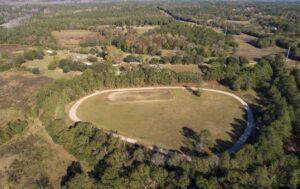
There’s a joke in equestrian circles: How do you make a small fortune in the horse business?
Answer: Start with a large fortune.
This is no joke when it comes to polo. Matches are divided into 7½-minute periods called chukkers, and a match typically has four to six of them. The word itself comes from the Hindi word “chakkar,” which means “circle” or “turn.” Polo players call their horses “ponies,” no matter the age. In higher level polo, players often use fresh ponies for each chukker, which means a four-person polo team might use 16 to 24 ponies a game.
Smaller horses and mares are preferred, and top ponies can cost $100,000 apiece and thousands more a year to feed and shoe. Polo team owners are known as “patrons” and often play on their own teams. They may hire pros to ride with them, akin to an owner of an NBA team running the floor with LeBron James or Stephen Curry.
All this means a serious polo patron may shell out millions of dollars to field a team. Given the high price of entry, the sport attracts the likes of Andrey Borodin, a Russian oligarch and polo patron.
His spectacular farm outside Aiken sprawls across several hundred acres. Borodin and his supermodel wife fled to the United Kingdom in 2011 after Russian authorities accused him of looting the Bank of Moscow, charges Borodin said were politically motivated.
Not far from Borodin’s farm, Nigerian oil tycoon Sayyu Dantata has horse fields and barns next to what appears to be a dirt landing strip. Dantata has been known to pilot his helicopter to polo fields outside downtown Aiken.
He also has been linked to networks of shell companies that billionaires used to evade taxes, connections outlined in the Panama Papers journalism investigation in 2016. However, he has not been accused of any criminal activity.
Florida has emerged as the U.S. center of high-level polo, but Aiken has advantages, even for those who have helicopters and private jets. Land and labor are less expensive than in Florida, and the city’s horse community is more concentrated and connected; its horse district downtown has stables; polo fields; tracks; horse-jumping venues; and the Track Kitchen, a longtime breakfast haunt for area equestrians.
And the sandy plateaus outside of Aiken have plenty of room for larger farms. An Aiken Chamber of Commerce study in 2008, the most recent of its kind, estimated that the county had nearly 7,000 horses in the area’s farms and stables. Those horses were worth $87 million in today’s dollars.
One medium-sized spread is Green Hill Farms, about six miles from the downtown horse district. It’s about 127 acres and has its own rollercoaster history.
In the 1980s, a real estate broker from California bought the land after claiming to have found a new way to freeze horse semen. He hoped to use the frozen reproductive fluid to yield show horses rivaling West German breeds known for their jumping prowess. Forbes magazine wrote at the time: “What happens if his studs turn out to be duds? Maybe (he) will have to put his whole business on ice.” Which is what happened; the farm ended up in bankruptcy court a few years later.
A couple from Pittsburgh acquired Green Hill Farms and moved to Aiken. But their health declined, and by 2001 the farm was back on the market.
This is when Sambo Dasuki and his wife entered the picture. Dasuki had owned a condominium in the mid-1990s on Polo Island, a gated community in Wellington, Fla. Now, in the early 2000s, they were in South Carolina looking at Green Hill Farms. With Dasuki was Alex Pacheco, an Argentinian polo photographer. He knew Aiken well.
Alex Pacheco
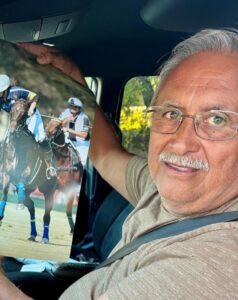
Alex Pacheco, a longtime photographer of polo matches, shows an image in Aiken near the farm he said was bought by ex-Nigerian defense advisor Sambo Dasuki.
Pacheco also lived in South Florida and traveled to polo venues across the country, photographing matches for publications and events. In a recent interview in Aiken, Pacheco said he began visiting the area in the 1970s because of its robust polo scene.
“There’s a lot of movement between Aiken and Florida because of polo.”
He said he first met Dasuki in the Washington, D.C., area at a polo event. They struck a friendship, sharing their love of polo, though he said Dasuki wasn’t much of a player himself.
“He is a nice man, a sweet man … who was a very simple person. … He liked watching polo and being with his family.”
On June 10, 2002, Dasuki purchased Green Hill Farms for $950,000 in what appeared to be a cash deal. There was no evidence of financing, real estate and U.S. Homeland Security records show. That same day, Dasuki transferred the property to his wife, Farida, for a dollar. At the time, Dasuki was the director of Nigeria’s mint.
Pacheco remained closely connected to the Dasukis and the farm. He paid the farm’s property taxes every year, except for four years when Farida Dasuki covered the bill. Her most recent payment was in 2023, Aiken tax records show. When asked about the farm’s ownership, Pacheco said Dasuki bought the farm and gave it to him. When asked about the reason for such a large gift, Pacheco said without elaborating that when someone does something for you, you do something for them.
There are no allegations that Pacheco engaged in any illegal activities. Dasuki and his wife did not respond to questions about the Aiken farm purchase sent to them through their lawyer and a spokesperson. The Dasuki spokesperson said that the family has “a strong legacy of success in business and entrepreneurship, independent of any government affiliation.” And he noted that the farm’s purchase took place when he was “a private citizen and businessman, well before his appointment as NSA (national security advisor.)”
But records from an immigration dispute after the farm’s purchase in 2002 reveal the family’s possible motives for buying Green Hill Farms. They also shed light on the unusual way the Dasukis paid for it.
4. Shell game

Transparency International U.S., an anti-corruption nonprofit, recently studied money-laundering prevention rules in more than 20 highly developed countries and found the United States’ checks and balances to be among the weakest. The group concluded the U.S. real estate market a “welcome mat for corruption.” Global Financial Integrity, another anti-corruption group, said that the American real estate market’s lack of transparency made it a “kleptocrat’s dream.”
Campbell, the former ambassador to Nigeria, said he wasn’t surprised that Dasuki bought a horse farm in South Carolina.
“I would suspect that he’s got lots of other assets in the U.S., or in the U.K., because that’s what rich Nigerians do. They essentially try to get as much of their money out of the country as they can.”
Ebenezer Obadare, the Council on Foreign Relations expert, added, “If you’re a member of the elite, it’s a certificate of authenticity to say, ‘OK, I’m involved in polo, and I breed horses,’ and so on.”
But the horse farm in Aiken ultimately became more than an overseas trophy. Over the years, the Dasukis traveled between Nigeria and the United States many times. In the late 1990s, they sought a more permanent residency status by requesting political asylum. But U.S. immigration officials in 1998 denied their request, arguing that the Dasukis failed to demonstrate they had been harmed or persecuted. In the early 2000s, the family tried a different tack — one that leveraged their newly purchased Green Hill Farms in Aiken.
Farida Dasuki applied for an EB-5 visa, which in immigration circles is sometimes called a “golden visa.” Foreigners qualify by investing in an American business that preserves or generates at least 10 jobs. With an EB-5 visa, foreign citizens and their families can live freely in the United States for years. Their children may be eligible for in-state tuition and scholarships, and this visa status often paves the way to U.S. citizenship.
But to get such a visa, applicants must prove they had a legal source of money for their new American investment. In her application, Farida Dasukis pitched a horse-breeding business at Green Hill Farms, records show. Money for the project came from Sambo Dasuki’s work as a consultant for the Nigerian branch of an American oil company, her application said. The company operated an offshore platform in Ghana, and Dasuki claimed that he had been paid $1 million to lobby Ghanaian officials.
Immigration documents reveal the U.S. government’s skepticism. In one, officials noted that Dasuki had no experience in the oil industry to justify the $1 million consultancy. They said the $950,000 used to buy the farm had arrived in Aiken in circuitous ways: through a chain of corporations in the Bahamas and Hong Kong before arriving in the coffers of a South Carolina corporation that handled the sale.
Homeland Security officials concluded there was no evidence that the money came from a lawful source, and that the farm itself didn’t seem to be an ongoing business. The U.S. government denied Farida Dasuki’s visa request.
But the Dasukis’ purchase of Green Hill Farms was just a prelude to much more stunning movements of money from Nigeria into the United States.
5. Mysterious LA heist opens door
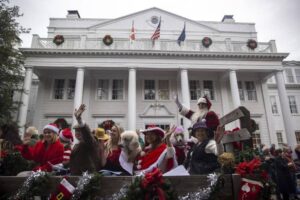
On Nov. 22, 2015, in a historic Los Angeles neighborhood, two intruders broke into a spectacular mansion. Two college students were in the home, including Sambo Dasuki’s son. The intruders forced the students to lie on the floor and then carried off two safes. The mansion’s owners later told police that the safes contained more than $40 million worth of jewelry, watches and gold-encased cellphones.
The owners were Robert and Mimie Oshodin, who operated a furniture factory in Nigeria. Police made several arrests, but Los Angeles prosecutors declined to pursue the case, citing a lack of evidence, records show. The Oshodins, meanwhile, filed theft claims with their insurer. When the insurer balked, the Oshodins took the company to court.
Their lawsuit opened an unexpected door into mysteries beyond the robbery: How did the Oshodins end up with so much money in the first place? What was Sambo Dasuki’s connection? And deeper questions: Did Dasuki’s friendly relationships in U.S. diplomatic circles help cloak his activities in the United States? Did U.S. law enforcement miss a chance in Aiken to prevent a much larger movement of questionable funds into American real estate?
Oshodin insurance claims diamond rings
Robert and Mimie Oshodin of Nigeria filed insurance claims in California for millions of dollars in jewelry and other valuables, according to these court records.
In testimony for the insurance case, Robert Oshodin said he was virtually illiterate and had minimal education but nevertheless managed to build a furniture export business. He said he and his wife had long been close to the Dasuki family.
“He cares for my children, I care for his children,” he testified in broken English.
The Oshodins’ fortunes also swelled in tandem with Dasuki’s return to power in 2012, records show. That year, Dasuki was appointed Nigeria’s national security advisor, the Nigerian president’s top defense aide. In this role, Dasuki oversaw the fight against the terrorist group Boko Haram. He also had access to huge sums of money. At least $27 million went into accounts controlled by the Oshodins, according to records Nigerian prosecutors later uncovered in their case against Dasuki.
One $12 million payment from Dasuki’s office was for a “counter radicalisation” program, records show. Nigerian prosecutors said the program never materialized. Oshodin testified in his insurance case that he didn’t know about the payment. Bank transfer documents show the same week the $12 million landed in his company’s account, the couple purchased the Los Angeles mansion for $9.5 million.
Oshodin insurance claims
Jewelry claimed stolen in a heist in Los Angeles in 2015 from the home of Robert and Mimie Oshodin, according to court records.
And this was no ordinary mansion.
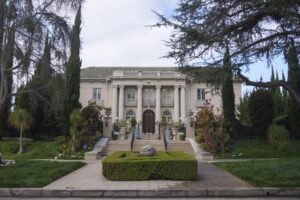
It once belonged to Norman and Dorothy Chandler, among Southern California’s most-prominent socialites. Norman Chandler was publisher of the Los Angeles Times, and Dorothy was known for hosting presidents Eisenhower, Kennedy, Johnson and Nixon. Oshodin testified the home had a 5,000-bottle wine collection and $1.1 million draperies.
The same month the Oshodins bought their L.A. mansion, they ponied up another $6.5 million for a 20,000-square-foot home in McLean, Va., outside Washington.
The rural estate included an 18-seat home theater and spa suite. Mimie Oshodin said she used the home as a stopover on long flights between Africa and Los Angeles.
The Oshodins lost their insurance fight. And Nigerian prosecutors arrested Sambo Dasuki in 2015, alleging that he stole $2 billion from the government during its fight against Boko Haram. Dasuki used Oshodin’s company as “a vehicle for money laundering,” prosecutors alleged in their indictments.
The impacts of Nigeria’s corruption problems were many, but especially when it came to its terrorism fight.
“We had so many casualties,” a Nigerian government soldier in the Boko Haram fight said in an NPR report at the time. “There wasn’t fuel in the vehicles. The commanders came out categorically telling us that there’s no fuel and they don’t have money.”
Did authorities in the United States blow a chance to turn off a spigot of stolen Nigerian government money? Karen Greenaway is a retired FBI supervisory special agent who specializes in anti-money laundering efforts. She said the Justice Department’s Foreign Corrupt Practices Act Unit was a relatively small group in the early 2000s.
It lacked the infrastructure necessary to tackle complex international money laundering and kleptocracy cases, especially if a target’s home government didn’t help document the sources of the funds. Greenaway said she has been told that Nigerian authorities did reach out to the federal investigators at some point about Dasuki’s holdings in the United States.
“You know, we have to rely on the Nigerians to get us some evidence here,” she said. “And they originally reached out, then they didn’t follow through, and then, basically, their infrastructure has just been decimated in terms of anti-corruption.”
But the flow of dirty money from Nigeria to the U.S. real estate market offers lessons for any country, said Ebenezer Obadare, the Nigerian expert with the Council on Foreign Relations.
“Nigeria is dealing with a full-blown normative collapse — a collapse in the understanding of what is wrong and right,” he said.
These norms are the threads that keep societies together. Once those norms disappear, corruption and disarray spread like a virus, as they have in places like Sudan and Haiti.
Asked why people should care about international money laundering, Obadare said: “The answer is very simple, because it’s wrong.”
6. Back to Aiken

It was a Sunday afternoon last November in Aiken’s horse district, and the Aiken Polo Club was holding one of the last matches of the fall season. Fans gathered under a pavilion for a catered lunch. Skies were pearl gray, but it was dry. Perfect for polo. Horses and riders charged across Whitney Field as they have since 1882, making these grounds the oldest in America in continuous use. Alex Pacheco, Dasuki’s friend, was off in the distance, taking photos.
A few weeks earlier, Pacheco was in his white van on a sand road by Green Hill Farms, the property Dasuki bought years ago. Pacheco had a gentle voice and wore glasses. A cross and beads hung from his rearview mirror. He held up a print of women playing polo. He said that Dasuki had only been to Aiken one time — to buy the horse farm.
“He’s out of it. I own it. I just haven’t filled out the paperwork.”
He later said that he didn’t want to talk about Dasuki because “he’s a very private person.”
The U.S. government in the early 2000s knew the farm was bought with questionable funding, but that seems to have been the end of it.
In Nigeria, corruption trials can last a decade or longer. Dasuki’s trial began in 2016. It is ongoing.
Nigerian prosecutors have tried to seize the Oshodins’ mansions near Washington and Los Angeles, but that effort appears to have stalled. The Los Angeles home is currently for sale. The asking price: $12 million to $15 million, depending on the listing. The horse farm in Aiken hasn’t been mentioned in any of the Nigerian prosecution documents.
The pastoral pace of the Sunday polo match on Whitney Field seemed far removed from the international shell games that cloak the movement of millions of dollars into American real estate. Far removed from the normative collapse in Nigeria that spreads like a virus to other countries. Far removed from the loose rules in the United States that easily allow kleptocrats to hide their loot.
Amid the mallet strokes, longtime Aiken residents chatted with a mix of newcomers from California, France and a scattering of Charlestonians. One was Thomas Ravenel, South Carolina’s former state treasurer who resigned amid federal cocaine charges and later starred on the reality show “Southern Charm.” Chip Limehouse, a former lawmaker, also moved to Aiken and was watching his daughter Eliza, another “Southern Charm” character, play on one of the women’s teams.
As the polo riders chased after balls, Limehouse said he was friends with Dantata, the Nigerian oil tycoon, whose farm was near his. And Limehouse and Ravenel both said they had heard whispers about Borodin, the Russian oligarch.
But Sambo Dasuki, once one of the most powerful men in Nigeria? Not so much.
Even in this cloistered world of horse-lovers and polo fans, there are secrets that have yet to be revealed. •
Follow the Neptune Prime channel on WhatsApp:
Do you have breaking news, interview request, opinion, suggestion, or want your event covered? Email us at neptuneprime2233@gmail.com


